Is Bermuda hay good for goats?
Well, from my research, I found that yes, Bermuda hay is good for goats. Bermuda grass hay is a warm-season grass that is commonly fed to goats and other livestock. It offers a balance of fiber and nutrition, making it a suitable component of a goat’s diet.
Bermuda hay, scientifically known as Cynodon dactylon, is a warm-season perennial grass that belongs to the Poaceae family.
It is widely cultivated for its exceptional forage qualities, making it a popular choice among livestock owners.
Bermuda hay is characterized by its fine texture, slender stems, and vibrant green color.
The leaves are narrow and smooth, providing a visually appealing appearance to the harvested hay.
It is known for its ability to withstand drought conditions and its rapid growth rate during warm summer months.
Common Uses And Benefits Of Bermuda Hay For Livestock
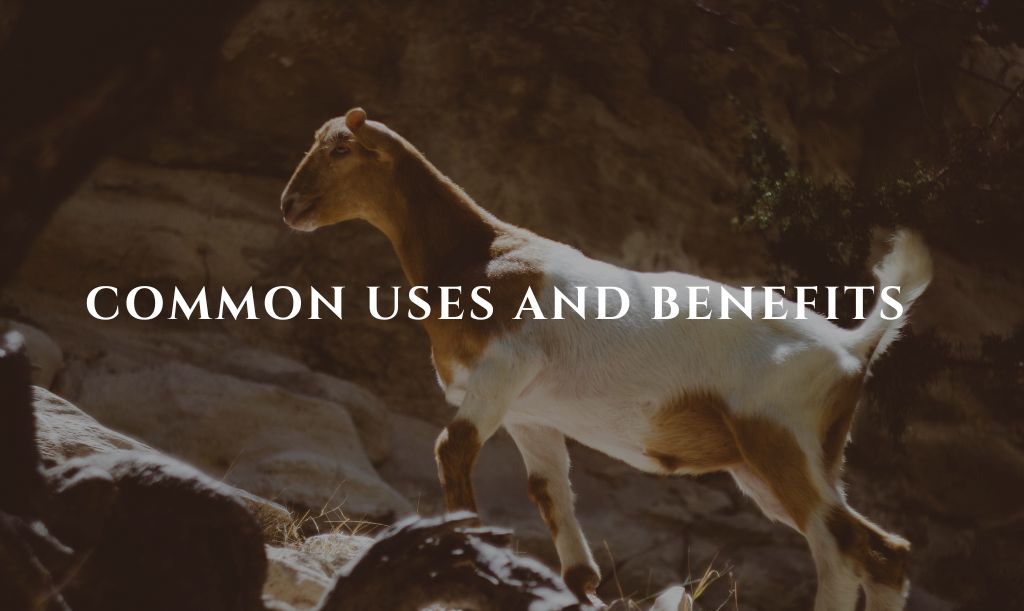
Bermuda hay has proven to be an invaluable resource in the world of agriculture due to its various uses and benefits for livestock.
One primary use of Bermuda hay is as a high-quality feed source for ruminants such as goats, sheep, and cattle.
Its rich nutritional content aids in meeting the dietary requirements of these animals, promoting healthy growth and development.
Additionally, Bermuda hay can be used as bedding material for animals due to its soft texture and ability to absorb moisture effectively.
Furthermore, it serves as an excellent means of erosion control in pastures or on agricultural land due to its dense root system that helps prevent soil erosion.
Overview Of Essential Nutrients Found In Bermuda Hay
Bermuda hay is a nutritional powerhouse for goats, packed with essential nutrients that contribute to their overall health and well-being.
This type of hay is rich in carbohydrates, providing goats with the energy they need to thrive.
Additionally, Bermuda hay contains a balanced profile of vitamins and minerals, including vitamin A, vitamin E, potassium, calcium, and phosphorus.
Vitamin A plays a crucial role in maintaining good vision and supporting a healthy immune system in goats.
Vitamin E acts as a powerful antioxidant, protecting the cells from damage caused by free radicals.
Potassium is important for proper muscle function and nerve transmission.
Calcium and phosphorus are essential minerals for strong bones and teeth.
Comparison Of Nutritional Content With Other Types Of Hay
When comparing Bermuda hay to other types of hay commonly fed to goats such as Timothy or Alfalfa, it’s important to note that each has its own unique nutritional composition.
Bermuda hay tends to be lower in protein compared to Alfalfa but still provides an adequate amount for goats’ needs.
The carbohydrate content in Bermuda hay is moderate compared to Timothy’s higher fiber content.
However, this makes it easier for goats to digest while providing them with sustained energy throughout the day.
While Bermuda may not have the same protein levels as Alfalfa or the high fiber content like Timothy, its balanced nutritional profile makes it an excellent choice for meeting most goats’ dietary requirements without compromising their health.
How The Nutritional Profile Meets The Dietary Needs Of Goats
The nutritional profile of Bermuda hay aligns closely with the dietary needs of goats.
Its combination of carbohydrates for energy and a range of vitamins and minerals contributes significantly to goat health.
Goats require an ample supply of carbohydrates as their primary energy source.
Bermuda hay provides this, allowing goats to maintain their activity levels and meet their energy demands.
The balanced vitamin and mineral profile found in Bermuda hay helps support various physiological processes in goats, including growth, reproduction, and immune function.
It’s important to note that the specific nutritional requirements of goats can vary depending on age, stage of production (e.g., lactation), and overall health status.
However, Bermuda hay serves as a reliable foundation in meeting the dietary needs of most goats while promoting their overall vitality.
Digestibility and Palatability Factors
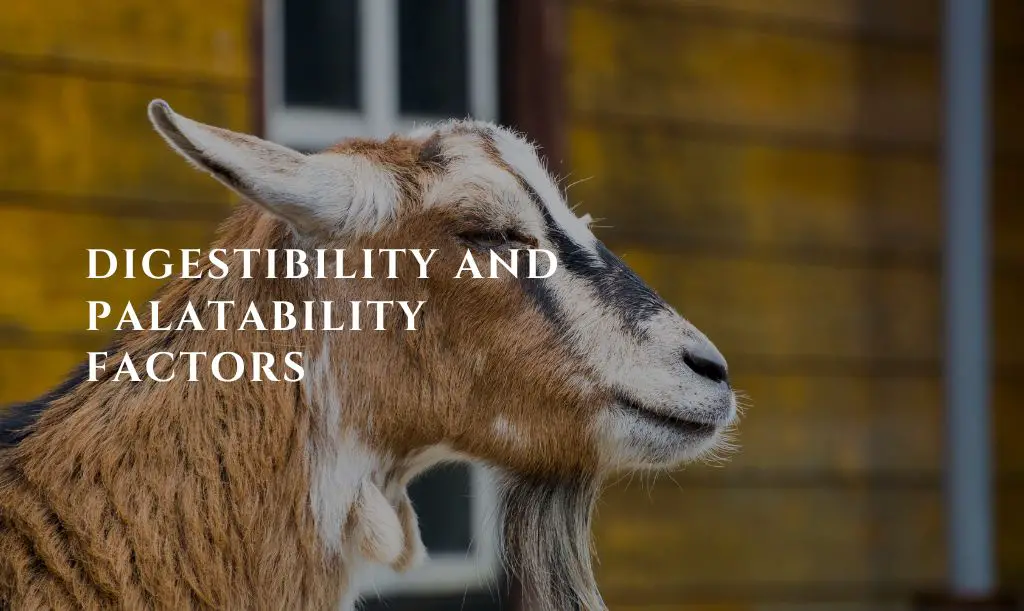
When it comes to the digestibility of Bermuda hay in goats, we need to understand how their marvelous digestive system works.
Goats are ruminant animals, meaning they have a four-chambered stomach designed to efficiently break down and extract nutrients from fibrous plant material.
The microorganisms residing in their rumen play a crucial role in this process.
Bermuda hay, with its fine stems and leaves, is highly digestible by the microbial population present in a goat’s rumen.
This allows for optimal nutrient absorption and utilization by the goat’s body.
Factors Influencing The Palatability Of Bermuda Hay For Goats
Palatability is a fancy word that simply means how tasty or appealing something is to our capricious goats.
Several factors influence the palatability of Bermuda hay for our discerning friends.
- Maturity stage at harvest time: As Bermuda grass matures, its stems become coarser and less tender. Goats generally prefer younger, more succulent plants with softer stems. Therefore, harvesting Bermuda hay at an earlier stage when it is still fresh and leafy increases its palatability.
- Leaf-to-stem ratio: The ideal Bermuda hay for goat consumption should have a high leaf-to-stem ratio. Goats are all about those delectable leaves! Higher leaf content not only enhances taste but also provides better nutritional value.
- Presence of weeds or foreign matter: Goats can be quite picky when it comes to their meals. They tend to avoid consuming hay contaminated with weeds or foreign matter such as dirt or debris. It’s important to select high-quality bales without these unwanted additions to ensure maximum palatability.
Promoting Healthy Digestion and Preventing Digestive Disorders
When it comes to keeping your goats happy and healthy, promoting good digestion is of utmost importance.
Luckily, Bermuda hay proves to be an excellent ally in this regard.
The high fiber content found in Bermuda hay is essential for maintaining a healthy rumen function in goats.
The long strands of fiber stimulate proper chewing and saliva production, which aids in breaking down the food and extracting vital nutrients from it.
Additionally, the fibrous nature of Bermuda hay helps prevent digestive disorders such as bloating and constipation.
It encourages regular bowel movements, preventing the build-up of gas in the rumen that can lead to discomfort or even more serious conditions like bloat.
By providing your goats with Bermuda hay as part of their balanced diet, you can help ensure their digestive system stays on track.
Impact on Weight Management and Overall Body Condition Score (BCS)
Maintaining an optimal body condition score (BCS) is crucial for goats at all stages of life.
Bermuda hay plays a significant role in helping goats achieve and maintain a healthy weight by balancing energy intake with exercise levels.
The abundant fiber content not only provides sustenance but also requires more effort from goats to chew and digest it properly.
For growing kids or lactating does who require additional energy, feeding them higher-quality Bermuda hay can provide that necessary boost without causing excessive weight gain or compromising their overall health.
On the other hand, for mature goats who may need to shed some pounds, offering lower-quality Bermuda hay can help manage their weight while ensuring they still receive essential nutrition.
Bermuda hay proves its versatility by aiding in maintaining optimal body condition throughout different life stages.
From supporting proper growth during kidhood to sustaining pregnant does through gestation, this hay variety helps keep your goats in their best shape.
Potential Concerns or Limitations with Bermuda Hay for Goats
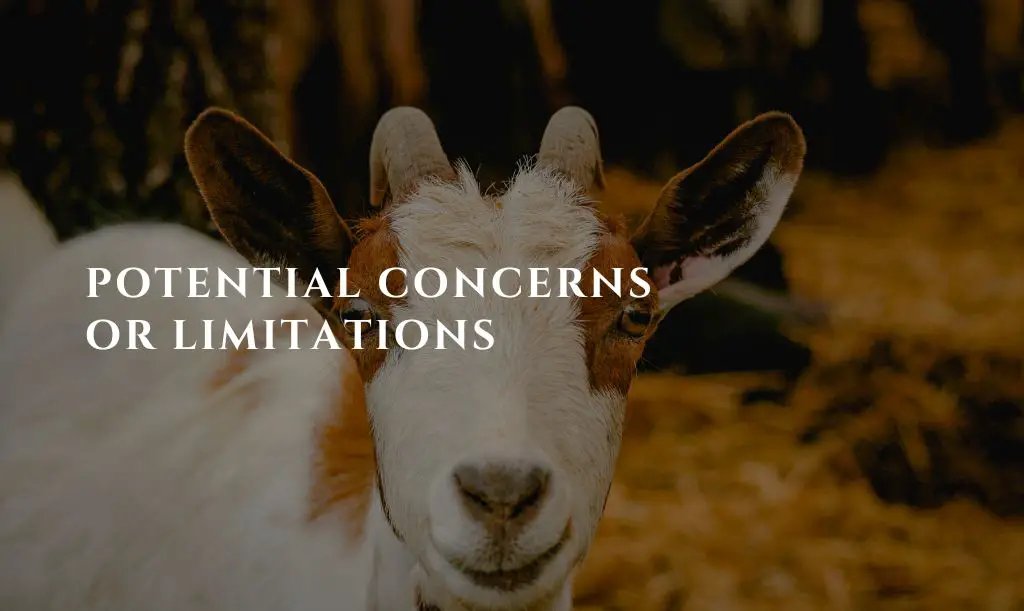
While Bermuda hay is generally considered a nutritious option for goats, it contains a naturally occurring compound called oxalate.
High levels of oxalate in the diet can lead to the formation of urinary stones or calculi in goats, posing a risk to their urinary health.
These stones can cause blockages in the urinary tract, leading to discomfort, pain, and potentially life-threatening situations.
It is crucial, therefore, to monitor the oxalate levels in Bermuda hay and ensure it is not the sole component of a goat’s diet.
A balanced diet that includes other types of hay with lower oxalate content and ample water intake will help mitigate these concerns.
Sensitivity to Weather Conditions during Harvesting Process
One aspect that goat owners should be mindful of when considering Bermuda hay is its sensitivity to weather conditions during the harvesting process.
Bermuda grass needs to be harvested at an optimal stage of maturity to maintain high nutritional value.
However, adverse weather conditions like excessive rainfall or prolonged droughts can impede this process and impact the quality of the hay produced.
Rainfall during harvest may cause baling delays, resulting in increased moisture content and decreased nutrient levels in the final product.
Conversely, drought can lead to stunted growth and lower overall yields.
Therefore, it is essential for producers to time their harvests appropriately based on prevailing weather conditions.
Potential Presence of Harmful Substances such as Blister Beetles
Another potential concern associated with Bermuda hay for goats is the presence of harmful substances such as blister beetles.
These insects are attracted to flowering plants like Bermuda grass and can accidentally end up baled within hay crops during harvesting.
Blister beetles contain a toxic chemical known as cantharidin, which is harmful to goats when ingested.
It can cause severe gastrointestinal distress, including irritation and ulceration of the mouth, throat, and digestive tract.
To minimize the risk, it is crucial to inspect Bermuda hay carefully for any signs of blister beetles before feeding it to goats.
Additionally, sourcing hay from reputable suppliers who implement proper pest control measures can help reduce this potential hazard.
By being aware of these limitations and taking necessary precautions, goat owners can ensure that Bermuda hay remains a valuable component of their animals’ diet while minimizing associated risks.
Tips for Feeding Bermuda Hay to Goats
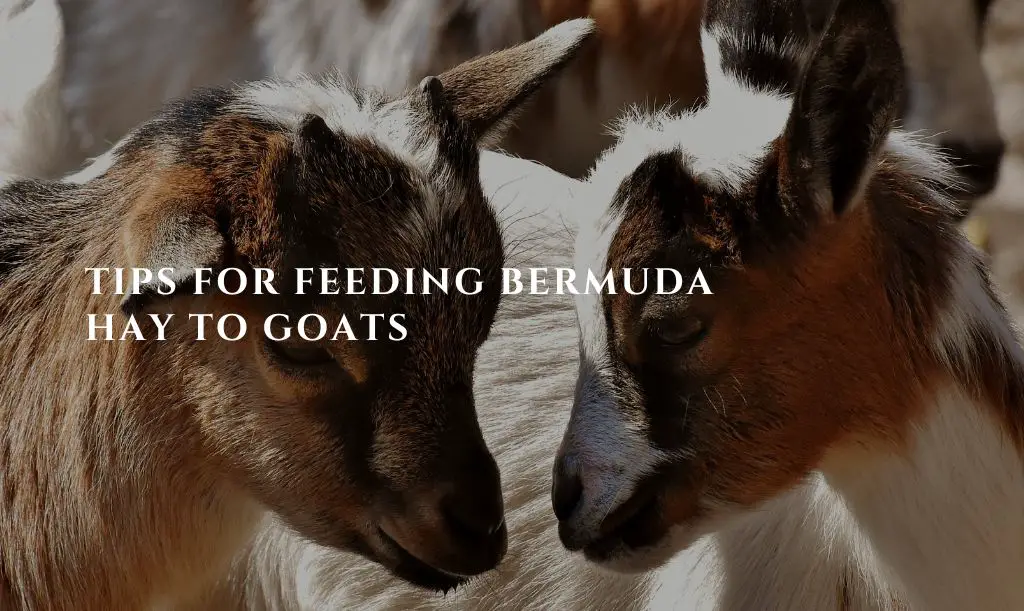
When it comes to storing Bermuda hay for your goats, proper techniques are essential to preserve its nutritional value and prevent spoilage.
Firstly, ensure that the hay is stored in a dry and well-ventilated area, away from moisture and direct sunlight.
This will help prevent the growth of mold or mildew, which can be harmful to your goats’ health.
Secondly, consider using a barn or shed with a raised floor or pallets to keep the hay off the ground and reduce the risk of moisture absorption.
Additionally, using tarps or covers can offer an extra layer of protection against rain or snow. Remember to regularly inspect your stored hay for signs of spoilage and remove any damaged bales promptly.
Introducing Bermuda Hay Gradually into a Goat’s Diet
When introducing Bermuda hay into your goats’ diet, it is crucial to do so gradually to avoid digestive upset.
Start by offering small amounts of Bermuda hay mixed with their current feed over several days, gradually increasing the proportion of Bermuda hay while reducing their previous feed portion.
This slow transition allows their digestive system time to adjust and adapt without causing any stress or discomfort.
Keep an eye on their behavior and stool consistency during this adjustment period as sudden dietary changes may lead to diarrhea or other digestive issues.
Monitoring Goats’ Consumption Levels
Monitoring your goats’ consumption levels is vital for ensuring they are getting an adequate amount of nutrition from Bermuda hay without overeating or wasting it unnecessarily.
While each goat’s consumption may vary depending on factors like age, weight, and activity level, a general guideline is providing 2-4% of their body weight in dry matter per day (roughly 20-40 pounds for a 1,000-pound goat).
Keep an eye on their body condition score (BCS) to determine if they are maintaining a healthy weight.
Regularly observe their eating habits, and make adjustments as needed based on their appetite and overall well-being.
Remember, it is always better to slightly underfeed than overfeed, as goats are prone to obesity-related health issues.
By following these tips for proper storage, gradual introduction, and mindful monitoring of consumption levels, you can ensure that your goats receive the maximum benefit from Bermuda hay while promoting their overall health and well-being.
Alternative Forages
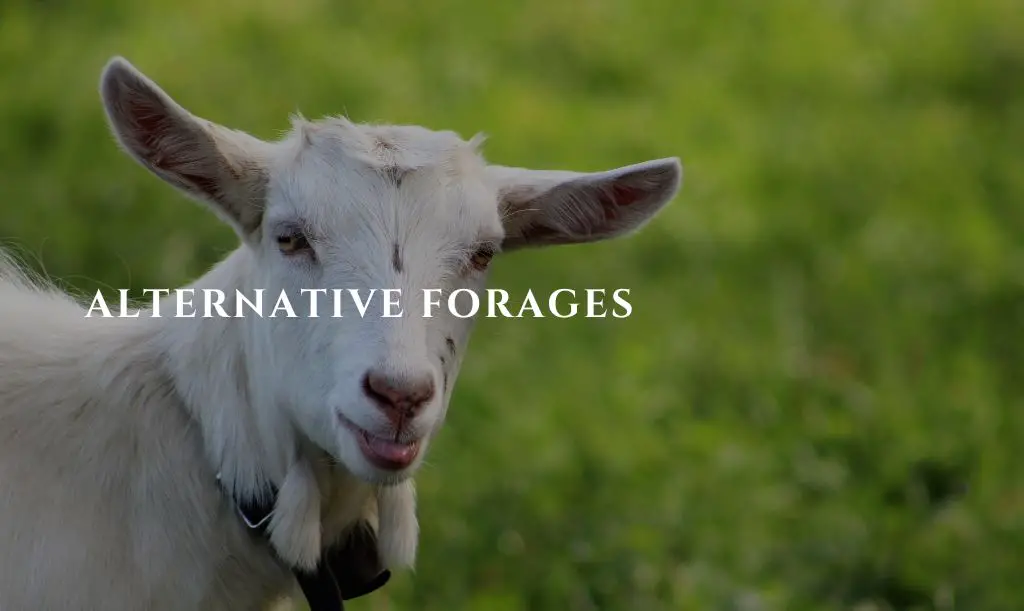
While Bermuda hay can be an excellent forage option for goats, it’s always beneficial to provide them with a varied diet.
Offering alternative forages can not only add nutritional diversity but also stimulate their taste buds.
Consider introducing legumes like clover or alfalfa, which are rich in protein and minerals.
These forages can complement the nutrient profile of Bermuda hay and contribute to overall goat health.
Additionally, browse plants like blackberry bushes or honeysuckle vines can serve as natural treats and enrichment sources while providing additional fiber.
Grass Mixtures and Pasture Rotation
Mixing different grass varieties in pastures alongside Bermuda hay can offer goats a more diverse grazing experience.
Other warm-season grasses like Bahiagrass or Timothy grass are worth considering.
Rotating pastures regularly allows time for grass regrowth, prevents overgrazing, and reduces the risk of parasites in grazing areas.
By implementing rotational grazing practices, you ensure that goats have access to different types of forage throughout the year, promoting their overall well-being.
Is Bermuda Hay Good For Goats? Conclusion
So, is bermuda hay good for goats?
Well, as we’ve seen, Bermuda hay can indeed be an excellent choice when it comes to feeding goats.
Its balanced nutritional composition, high digestibility rate, and palatability make it a reliable source of sustenance for these curious creatures.
However, keep in mind that offering alternative forages and practicing pasture rotation will further enhance their diet and mental stimulation.
By providing a varied menu and ensuring proper management of grazing areas, you’re not only supporting your goats’ health but also making their days filled with flavorful adventures!
Related Articles:
- https://farmyardfables.com/do-goats-need-light-at-night/
- https://farmyardfables.com/vegetable-oil-for-constipated-goat/
FAQs
Teff hay for goats
Teff hay can be a suitable and nutritious forage option for goats. Teff is a warm-season grass that is known for its fine stems and high nutritional value. When used as hay for goats, teff provides a good source of fiber, protein, and essential nutrients. Goats generally enjoy the taste of teff hay, making it a palatable option for their diet.
- Do Goats Sound Like Humans? Find Out Here! - 22 December 2023
- Vegetable Oil For Constipated Goat (Comprehensive Guide) - 22 December 2023
- Is Bermuda Hay Good For Goats? (Solved!) - 21 December 2023


